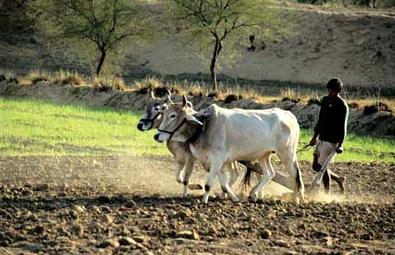Farmers' leader in Wardha Vijay Jawandhia once remarked: "If I were given a choice, I would like to be born as a European cow, but certainly not as an Indian farmer, in my next birth." There, a cow gets a US $ 2 subsidy per day and enjoys all the comforts. "And here, in India, a farmer is a debtor all his life. Post his death, his son inherits his debts and has to borrow money for his funeral."
Jawandhia was summing up the mood sweeping through the farming community particularly in the crisis-ridden Vidarbha. But his sarcastic remark underlines the great contrast that marks the global trade, touted by many a leading economist as an answer to all the problems. For many of those who have been singing to the tune of WTO, the Indian farm crisis is the ugly fallout of "lack of reforms". Their argument is that there are too many government strings attached to the policies; we need to detach them for growth and prosperity of the poor agrarian masses.
A close look at the processes that plague Indian agriculture contrast those claim.
Much before the distress set in, Vidarbha farmers rejoiced in near self-sufficiency on all fronts – food, clothes, seeds, fertilizers, festivals, marriages, construction and you name it. Pre-1991, nobody ever heard of farmers taking their own lives, almost never. Veteran farmers and farm leaders in the region confirm this almost unequivocally. Farmers were poor, but they ate enough and were not in debt trap.
Today, and as reported in earlier articles, this eastern region of Maharashtra sits on an "agrarian volcano". With cotton farmers ending themselves at an alarming rate, the agrarian crisis of the region now goes far beyond the suicides. The green fields are transforming into killing fields. The past four years have seen hundreds of farmers take their own lives in a region rich in cotton, paddy, soybean and oranges. The year gone by – that is 2005-06 agriculture season – has seen close to 550 farmers' suicides in Vidarbha. In the last five months alone, over 300 farmers ended themselves -- all due to ruthless policies of the past decade that pushed them to brim. The malady is only getting worse.
Until 2003, suicides were reported from the cotton belt only. Now farmers from a much better-off plateau – one producing paddy – are following the trend. Those holding on to the life have little hope of lifting themselves out of the crisis, unless the state hikes its investments in agriculture sector and takes corrective steps on policy–front. So far, there are no signs that the situation might improve. The crisis needs immediate attention.
General Greenhouse Management
Greenhouse Construction
Climate Control in GH Structures
Greenhouse Management: Soil Sterilization and preparation, cultural practices in flower and vegetable cultivation
Irrigation and Fertigation Technology
Crop Protection
Post Harvest and Marketing
Ergonomics

Marketing of Horticultural Produce
Importance and Scope
Post-Harvest and Handling
Marketing Channels
Domestic & Export Marketing : Potential Markets & Procedures
Logistics and Planning
Marketing of Allied Products
Post-Harvest and Handling
Marketing Channels
Domestic & Export Marketing : Potential Markets & Procedures
Logistics and Planning
Marketing of Allied Products
FUNDING SCHEMES
Bank of Maharashtra
Minor Irrigation for Agriculturists scheme for purchase of various irrigation equipments.
Mahabank Kisan Credit Card scheme for cultivation of crops, meeting the short-term credit needs of farmers.
Farm Mechanisation for Agriculturists scheme for Purchase of Tractors/Power tillers, Harvesters, Threshers & other farm
implements.
Animal Husbandry scheme for Purchase of animals, Poultry- Broiler Farm, Layers Farm, Hatchery Sheep/Goat Rearing Construction
of Byre, and Purchase of Machinery Working Capital Requirements under
Scheme for Cultivation of fruit crops-mango, Pomegranate, Grapes etc.
Scheme for providing finance to set up of Agri-Clinics/Agribusiness Centers.
Scheme for Financing Farmers for Purchase of Agricultural land.
Scheme for Financing Two Wheelers to Farmers
Scheme for Providing Loans to Farmers for Purchase of consumer durables
Scheme for Hi-tech projects in agriculture.
Rural Godown Scheme (Gramin Bhandaran Yojana) for scientific storage of agricultural produce.
Minor Irrigation for Agriculturists
Purpose :
Digging of new wells, revitalization of existing well, purchase of oil engine, electric motor, pump set installation of pipe line, sprinkler, irrigation, drip irrigation, tube well, bore well, etc.
Eligibility : Agriculturist who owns agricultural land.
Amount : For new dug wells as per the NABARD Unit costs for equipments/estimates.
Repayment : Depending upon the repaying capacity 7 to 11 years.
Security : Mortgage of land, Hypothecation of movable assets and guarantors.
Other Terms & Conditions :
Proposed well should be located in white watershed area. It should not be in dark watershed area.
Minor Irrigation for Agriculturists scheme for purchase of various irrigation equipments.
Mahabank Kisan Credit Card scheme for cultivation of crops, meeting the short-term credit needs of farmers.
Farm Mechanisation for Agriculturists scheme for Purchase of Tractors/Power tillers, Harvesters, Threshers & other farm
implements.
Animal Husbandry scheme for Purchase of animals, Poultry- Broiler Farm, Layers Farm, Hatchery Sheep/Goat Rearing Construction
of Byre, and Purchase of Machinery Working Capital Requirements under
Scheme for Cultivation of fruit crops-mango, Pomegranate, Grapes etc.
Scheme for providing finance to set up of Agri-Clinics/Agribusiness Centers.
Scheme for Financing Farmers for Purchase of Agricultural land.
Scheme for Financing Two Wheelers to Farmers
Scheme for Providing Loans to Farmers for Purchase of consumer durables
Scheme for Hi-tech projects in agriculture.
Rural Godown Scheme (Gramin Bhandaran Yojana) for scientific storage of agricultural produce.
Minor Irrigation for Agriculturists
Purpose :
Digging of new wells, revitalization of existing well, purchase of oil engine, electric motor, pump set installation of pipe line, sprinkler, irrigation, drip irrigation, tube well, bore well, etc.
Eligibility : Agriculturist who owns agricultural land.
Amount : For new dug wells as per the NABARD Unit costs for equipments/estimates.
Repayment : Depending upon the repaying capacity 7 to 11 years.
Security : Mortgage of land, Hypothecation of movable assets and guarantors.
Other Terms & Conditions :
Proposed well should be located in white watershed area. It should not be in dark watershed area.
